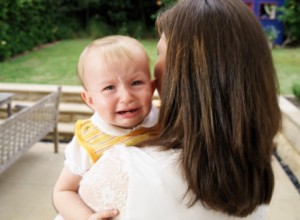Shaken baby syndrome, more recently dubbed Non-Accidental Head Trauma (NAHT), happens when an adult shakes an infant rapidly. The infant’s brain rests inside the skull, surrounded by protective fluids. The back and forth motion caused by shaking forces the infant’s brain into the sides of the skull repeatedly, resulting in contusions and brain damage. The swelling caused by these contusions can be so severe that the infant dies. 
Shaken Baby Cases Doubled During Recession
Researchers recently found that non-accidental head trauma happens much more often during times of financial stress and that the resulting injuries are more severe. Hospitals dealt with twice as many cases of shaken baby syndrome during the country’s recent economic trials.[1] The mean age of babies suffering for head trauma was four months.[2] While the study could not determine who abused these infants, parents, relatives, and even professional daycare workers are all likely sources of harm during times of stress.
Growing Economic Pressures Raise Frustration Levels
People generally have a harder time making ends meet during a recession. When someone loses a job or must manage a pay decrease, stress rises to dangerous levels. A person already frustrated and under stress can lose some of his or her self-control.
Even healthy babies cry often. Infants with colic or acid reflux problems tend to cry more frequently and intensely, increasing the stress levels for caregivers. If the caregiver loses self-control and shakes the infant, the results could be permanently debilitating or even deadly.
Caregivers Taking Stress Out on Infants
Daycare workers earn lower-than-average wages, making them more likely to undergo economic difficulties during a recession. Even when times are good, they must care for demanding children all day, every day, increasing their risk of becoming overwhelmed and injuring a child. As more parents need to find work during a recession, more children require daycare at least part of the day. The result is high enrollment at daycare centers with workers who are also under economic stress and greater workloads.
In some cases, families are moving in with relatives who may not practice the same level of care when watching an infant. When the caregiver has no training and little stake in the infant’s well being, head injuries become more likely.
Parents Rely on Daycare Workers for Child Safety
Daycare workers are professionals. They undergo specific training to learn how to manage the stress of caring for children daily. Parents rely on these professionals to keep their children safe from harm.
When a childcare worker begins to feel overwhelmed, he or she should seek help from another worker. Losing control and shaking an infant is unacceptable. Often, a ten-minute break for quiet is all the worker needs to regain control and keep the infant safe from harm.
Contact Us
If your child suffered a severe brain injury at the hand of a daycare worker or family member, contact our office as soon as possible. Our professional and experienced attorneys will be able to help you decide your next legal steps at no cost to you.
[1] http://www.businessweek.com/lifestyle/content/healthday/651828/
[2] http://www.newswise.com/articles/study-analyzes-non-accidental-head-trauma-in-infants-and-the-economic-recession-child-abuse-connection


